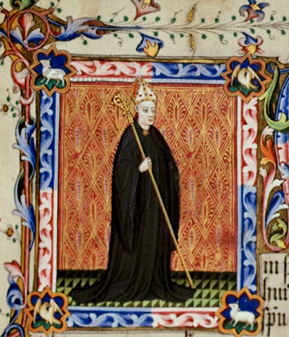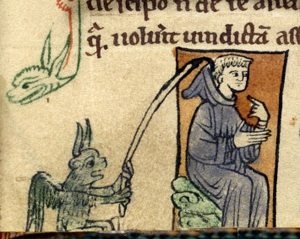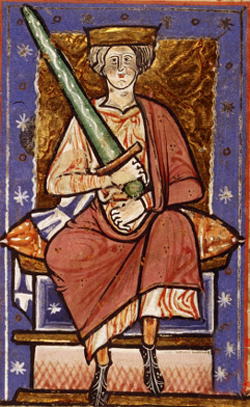 |
The Saint of the Day
St. Leutfridus, June 21
Prof. Plinio Corrêa de Oliveira
Biographical selection:
This was an extraordinary saint who is not well known, but an outstanding example to our tepid epoch. He was born in the mid-7th century near Evreux, France, of a good family, which he left to be a priest. After many trials, he founded La Croix-Saint Qu’en Abbey [Holy Cross Abbey], latter called Saint Leufroy Abbey in his honor. Because of his rigor, he suffered persecutions from the lax Bishops of the time. He had the gifts of miracles and prophecy.

A woman was punished for mocking the bald abbot
|
He was very severe. One day a woman mocked him because he was bald. He told her, “Why do you mock me for a defect of nature? You will be punished for this action. It will happen that you – and all your posterity – will have no more hair on the back of your head than I have on the top of mine.” The curse was fulfilled to the letter.
One day he came across some peasants working on Sunday. He raised his eyes to Heaven and said, “Let this land be sterile and never a grain sprout here again.” From that day forward, the ground produced only weeds and thorns.
St. Leutfridus had an ardent zeal for justice, only surpassed by his zeal for mercy, expressed by his love for the poor. While he was abbot of La Croix-Saint-Qu’en, a monk died and three coins were found on his person in violation of the vow of poverty. Leutfridus ordered the monk to be buried in profane land, not in the abbey cemetery. Afterward, he made a 40-day fast, praying and weeping for the soul of that monk who was apparently lost. After this penance, the Lord revealed to him that the soul of the monk had been freed from Purgatory.
He had a terrible fury against the Devil. Once when he was in his cell, a monk came to tell him that the Devil had taken the shape of a monstrous animal and was in the chapel causing havoc. St. Leutfridus hurried to the chapel, but before facing the Devil, he went to each door and window and made the Sign of the Cross over them to close the exits. Then he advanced, and bit the animal furiously. The Devil tried to flee, but was prevented from leaving by the normal exits because of the Sign of the Cross the Saint had made over them. He tried to release himself from the animal body he had taken on, but God did not allow him to do so. St. Leutfridus continued to exorcize and bite him, until the monster found a way to escape through the top of the bell tower and disappeared.
Comments of Prof. Plinio:
These splendid facts from the life of St. Leutfridus suggest several different thoughts.
First, the episode of the saint cursing a woman who mocked him for being bald in a certain way replicates what happened to the Prophet Eliseus, who ordered a bear to devour some boys who had mocked him for the same reason, because he had no hair. It was a lack of respect for a man of God that deserved punishment, even though today the actions of St. Leutfridus and the Prophet Eliseus certainly clash with the liberal mentality of many people. It is good for us to examine our reaction in face of these two facts. We should observe how shocked we are over these punishments to determine the degree of liberalism with which our souls are contaminated.

A devil was causing havoc in an abbey church
|
Second, the incident with the peasants shows the zeal of St. Leutfridus for the glorification of God on Sunday. It should make us consider how seriously the commandment not to work or make money on Sunday must be taken. In the wake of the many greater errors of Progressivism, today we see the complete relaxation of the Third Commandment. Who actually respects the command to rest on Sunday as we should? I believe very few. It has become common to open stores and shop on Sundays and to work as on any other day. Before the Council, the ones doing these things were the enemies of the Church – the pagans and Masons. Catholics would never open their businesses on Sunday or shop on this day. Here we have St. Leutfridus reminding us that to work on Sunday deserves punishment, a punishment that will come in this life, as for those peasants, or in the next.
Third, the episode of the monk who died having some coins in his possession demonstrates well the balance between the Saint’s justice and mercy. On the one hand, he forbade the body of the monk to be buried in sacred ground – again, a very anti-liberal decision. On the other hand, he had so great a pity for the state of that poor soul that he took it upon himself to pay for his fault, doing penance and fasting for 40 days. It is a splendid example of the equilibrium of the Catholic spirit. The harmonic presence of justice and mercy in the soul of St. Leutfridus is a shining mirror of the harmony between these two virtues that exists in the Catholic Church.

We should hate and take a militant position against the Devil
|
The practice of a Catholic virtue always reflects one aspect of God. But when we have opposed virtues together - justice and mercy - such as we see here, they reflect God more perfectly, because we understand God in the harmony of the apparently opposed virtues, which allows us to better understand God as a synthesis of all virtues.
Fourth, St. Leutfridus’ hatred of the Devil teaches us different things. I have seen many people who flee the Devil moved by fear. But I have seen fewer people who hate the Devil. This latter attitude should be much more common than it is. Indeed, if we really love Our Lord and Our Lady, we should normally hate their enemies.
Now then, there is no greater enemy of Our Lord than the Devil. We should hate the Devil, therefore, with a hatred similar to that of St. Michael the Archangel, who drew his sword against him in the first celestial battle and drove the Devil and his cohorts from Heaven to Hell, indignant at his revolt against God. His battle cry, Quis ut Deus? [Who is like unto God?] expresses well his position of soul.
We should imitate St. Michael and take up his fight in the Church Militant. Wherever the Devil and his followers appear with some trap or maneuver, we should hasten to destroy them with that same spirit of indignation. This should be our constant position against the Devil and the enemies of the Church. St. Leutfridus is an excellent example for us.
For his instinctive opposition to Liberalism, for his harmonic and opposed virtues, and for his hatred against the Devil, St. Leutfridus should be more invoked among Counter-Revolutionary Catholics. Let us ask him to protect us and inspire us imitate him.


  | | Prof. Plinio Corrêa de Oliveira | |
The Saint of the Day features highlights from the lives of saints based on comments made by the late Prof. Plinio Corrêa de Oliveira. Following the example of St. John Bosco who used to make similar talks for the boys of his College, each evening it was Prof. Plinio’s custom to make a short commentary on the lives of the next day’s saint in a meeting for youth in order to encourage them in the practice of virtue and love for the Catholic Church. TIA thought that its readers could profit from these valuable commentaries.
The texts of both the biographical data and the comments come from personal notes taken by Atila S. Guimarães from 1964 to 1995. Given the fact that the source is a personal notebook, it is possible that at times the biographic notes transcribed here will not rigorously follow the original text read by Prof. Plinio. The commentaries have also been adapted and translated for TIA’s site.
|
Saint of the Day | Home | Books | CDs | Search | Contact Us | Donate

© 2002- Tradition in Action, Inc. All Rights Reserved
|
 |

|